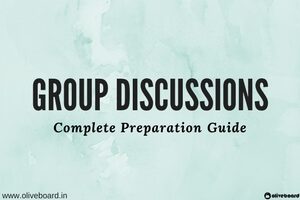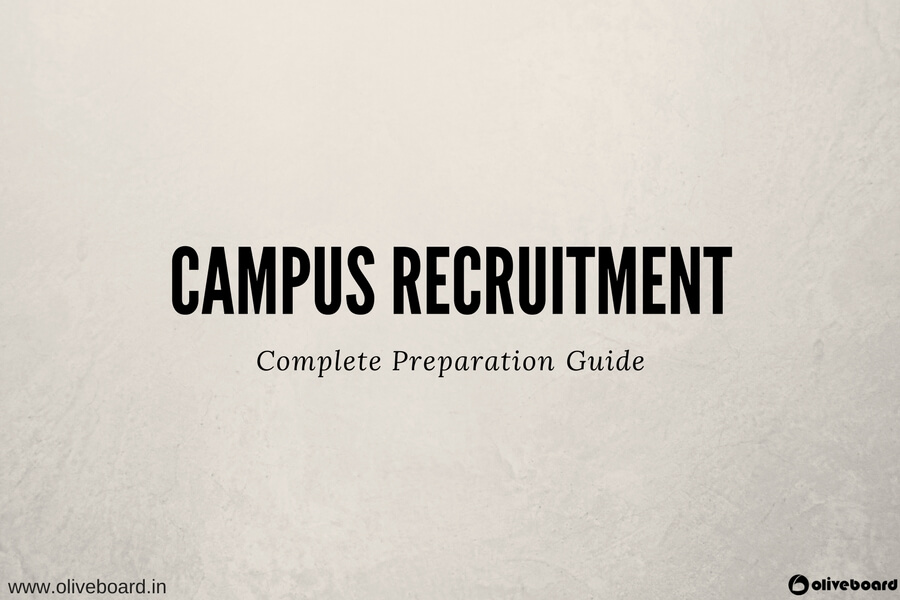Every year hundreds of companies visit college campuses to recruit freshers in their companies. It’s in fact, a matter of pride for students to get selected while being on campus. This projects a high value of the student.
Campus placements are a risk-free way of finding jobs. What’s more? Companies often lower their recruitment standards for students.
However, there’s much more than technical knowledge that required to clear a campus recruitment interview. In the following article, we are providing you a detailed preparation guide to clear your campus interview. Download it as a PDF to use it as a handy guide.
Know about the companies
Every college has multiple companies coming ever year for campus recruitment. Find out which companies visit your college for placements from your placement cell and maintain a track sheet for those companies. Write down the dates when they’re organizing the recruitment drive in your college, their official website address, links to their social media channels and a brief description about the company.
Now it’s very important that you do an extensive research on these companies and learn everything you can about them. Here are some things that you should know:
- Name of the CEO & founder
- History
- Products and Services they offer
- Location
- Major news about the company
- Milestones
- Competitors (other major players in the industry)
- About the industry
- History and future of the industry and the company
- Major challenges and trends
Though almost every company holds presentations before the interviews, it’s important that you read up about them on their website and social media channels. Use your networks and if any of your seniors is working in the company, ask them about the recruitment process, interview, etc. When you’re given a chance to ask them questions after the presentation, don’t hesitate.
Ask them about the job profile, the qualities they are looking for in their prospective employees, typical day at the job and/or something unique that you noticed about them during your research or during the presentation. So it’s important that you pay attention during the presentation.
Why is it important to research about all companies visiting your campus?
Sometimes, a company might terminate their visit and instead of them, some other companies’ visit might get scheduled. Therefore, knowing about every company that’s going to visit your company helps in such situations. In fact, you can write down their details in brief on the track sheet you’re maintaining.
Tailor your resumes
One of the things that will instantly set you apart from the crowd and get you noticed is your resume. We suggest you spend a fair amount time writing your resume. Do not just fill out a preset template. It goes without saying, that your resume needs to be customized according to the company and job profile you’re applying for. A resume made for profile of a business analyst needs to be different from a resume made for profile of a coder.
Do a thorough research about the job profile and the company. Talk to your Seniors or friends or acquaintances working in that company and take their help. Most companies have a preferred format of resume.
Have your resume(s) reviewed by your friends, peers, and placement officers. Take their feedback and make necessary changes in your resume. Your resume is an indispensable tool. It needs to be properly structured and formatted. Use simple language, check multiple times to make sure there are no errors, do not use fancy fonts or colors and make sure your resume layout is clear.
Things you should include in your resume:
Summary, Educational qualification, Objective, Skill sets, Hobbies, Work experience, Internships, Projects, Extra-curricular activities (highlight where you outshine others), Personal data.
Your resume should reflect your strengths and weaknesses in such a way that it supports your efficiency in the job position. Even your personal data needs to direct to your improvement in the professional field. Don’t include too many details about your projects. This will give you a chance to explain about them to the interviewer later and impress her/him.
Prepare for the interview
Now that you have set your resume, it is time you start preparing for your interview. Though most companies intimate you about their recruitment process, there are many who don’t. You can however prepare based on the following format which a lot of companies follow:
- Group Discussion
- Technical and HR Interview
We’d suggest you download model recruitment exam questions from google and also use your networks to determine the kind of questions you will be asked.
Aptitude Test
Generally, in aptitude tests, you’re tested on your decision-making, problem-solving skills, logical abilities, math and English vocabulary and comprehension. 2 months of preparation should be good enough to master it.
The aptitude tests usually contain three sections: Quantitative Aptitude, Reasoning and English language.
Following are some of the important topics you can prepare for:
Quantitative Aptitude: Logarithms, time and work, permutation and combination, HCF and LCM, geometry, profit and loss, simple and compound interest, algebra, percentages, speed and distance, arithmetic, etc.
Reasoning: Logical reasoning, puzzles, data interpretation, direction, venn diagrams, blood relations, arrangement, number series, directions, graphs, data sufficiency, etc.
English Language: Reading comprehension, antonyms & synonyms, sentence completion, vocabulary, paragraph completion, fill in the blanks, etc.
Practice latest campus interview aptitude questions. Click on the banner:
 Group Discussion
Group Discussion
Group discussions are vital. In group discussions, you will be part of a group of 20-25 candidates and will be given a topic to discuss by a panel. The panel monitors the discussion. You will be evaluated on your ability to interact, listen to others, lead the discussion and conclude it and also on the knowledge on the topic.
You need to be careful not to be too assertive or submissive while giving your opinions. Practice holding group discussions with your friends and family to get the right balance.
For a detailed guide on Group Discussions, click the banner on the left!
Technical and HR Interview
You need to know the in and out of your domain. We suggest you brush up your basics on your subjects for your technical interview. In the technical round, your knowledge about the domain you’re applying for will be tested. Make sure you come completely prepared.
It’s important that you know what you have written in your resume. You will be asked questions based on what you have entered in your resume. Therefore, do not exaggerate. At the same time, don’t get demotivated if you couldn’t answer a couple of questions. Sometimes interviewers ask you difficult questions that are hard for freshers to answer. This is to see how you handle the situation. In such situations, don’t panic. Either tell the interviewer that you don’t know the answer, or make an educated guess and answer smartly using whatever knowledge you have about that particular question. But do not lie or bluff.
While it is important to appear confident during your interview, your body language shouldn’t suggest that you’re over confident or worse, a brat! Relax and have a relaxed body language.
Sometimes the interviewer might come off as rude, or might actually be rude. This could be a stress interview to check how you would behave in such situations. Take a cue and keep calm.
General tips to clear your interview
- It’s advisable to take mock interviews and rehearse many times before appearing for the interview.
- Make sure you do proper research on the company. Check reviews of their interview processes and get insights on what the company focuses on during the interview. Most companies have a standard set of questions that they repeat throughout their recruitment drive. Therefore, it is helpful to look up placement papers on these companies on google. However, do not mug up the answers. Use placement papers as guideline to prepare for your interview.
- Don’t be late to the interview. Nothing pisses off the HR like a latecomer. Arrive 15 minutes early.
- Make sure you’re carrying all the important documents (neatly arranged in a file) required for the interview:
- 3-5 copies of your updated resume
- Passport
- Address proof
- Class X and XII certificates
- Certificates of your achievements (academic and extra-curricular)
- Don’t ramble on during interviews and do not get carried away while talking. Your answers should be concise and to the point. Do not try to impress the interviewer(s) by being quick in answering as giving unnecessary elaborate answers. Sometimes this could lead to not listening to the questions properly and giving wrong answers.
- Body language: It’s important that you appear confident, calm and composed during the interview. Knock on the door and ask before entering and do not sit until you’re asked to. Do not keep your hands on the table; place them on your lap and keep your back straight. Maintain eye contact with the interviewer(s) throughout the interview (it’s a sigh of confidence and fearlessness). Do not forger to smile. Absolutely avoid touching your hair or face during the interview or breaking your knuckles as this might make you seem ‘fidgety’.
- Grooming: It’s important that you look presentable and neat. Don’t dress casually. If you’re a guy, wear ironed formal shirt and trousers, polish your shoes and clean shave your beard. If you’re a girl, wear loose fitting formal clothes, do not leave your hair open. Make sure your hair is neat and trimmed. First impressions are very important.
- You don’t have to answer every question right away. If you aren’t sure about a particular question, you could ask the interviewer(s) to give you a few extra seconds to think before answering. Don’t be scared to admit if you don’t know the answer.
- Do ask questions to your employer. If you don’t ask your employer any questions, it might seem like you’re not interested in the role. Prepare some questions to ask before the interview and make sure that they aren’t personal. Asking questions can also help them take notice of you. Ask questions on your job profile, work environment, training period, etc. An interview must be a two-way process.
- Absolutely avoid controversial subjects: Sometimes interviewers might bring up controversial topics to test your tolerance. Refrain from using abusive language.
- Finally, follow-up with a thank you. Ask your interviewer(s) for their business card(s) and drop a thank you by mail if you have been corresponding via email previously. Also ask them when you can expect to hear back from them. You could also ask them for a review of your interview performance.
- Do not be discouraged if you don’t make it through the interview. Take this as a learning experience to prepare for your future interviews.
We hope the above tips help you crack your campus placement interviews with flying colors. Download this as a PDF to use it as a handy guide.
Practice Quant, Reasoning and English questions for your campus placement aptitude test:
Further reading:
Common questions asked in campus recruitment interviews
Deloitte Campus Recruitment Process and Eligibility 2017
Accenture Campus Recruitment Process and Eligibility 2017

The most comprehensive online preparation portal for MBA, Banking and Government exams. Explore a range of mock tests and study material at www.oliveboard.in


